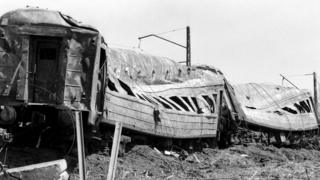 Image copyright
SPUTNIK / Alamy Stock Photo
Image copyright
SPUTNIK / Alamy Stock Photo
Thirty years ago, a large-scale pro-democracy protest on Beijing's Tiananmen Square was brutally stamped out by China's Communist rulers.
On 4 June 1989, tanks and troops were sent in to occupy central parts of the Chinese capital, firing at protesters and bystanders who got in their way.
Estimates of the numbers killed during the crackdown range from the hundreds to the thousands.
With the international media's gaze firmly fixed on Beijing, reports about the scale of the massacre sent shockwaves across the world.
But more than 4,000km (2,400 miles) away in Russia's Ural Mountains, another deadly catastrophe was unfolding.
In one of the Soviet Union's deadliest train accidents, a gas explosion ripped through two Kuybyshev Railway trains travelling near the city of Ufa, leaving hundreds of their 1,300 passengers injured or dead.
Gas had spilled out from a faulty pipeline near the railway, creating a highly flammable cloud in the path of the trains. As the trains passed each other, sparks from their wheels ignited the gas, causing a huge explosion.
The explosion erupted with a force equivalent to 10 kilotons of TNT, engulfing both trains in flames, according to a report by Sputnik news agency.
Many of the victims were families with children travelling to and from a holiday resort on the Black Sea. It was described as a "major catastrophe" by state news agency Tass.
Mikhail Gorbachev, then president of the USSR, said it was a "real hell there" after visiting the accident site.
Soviet and international media, most notably The New York Times, covered the story. In its article, the Times reported that Soviet television showed "unusually graphic scenes of the aftermath".
Yet, despite the magnitude of the tragedy, it seems to have slipped from collective consciousness to some extent.
Surprisingly, three separate historians of the Soviet Union told the BBC they have little or no recollection of the Ufa train disaster.
The lack of coverage it received was "typical of the USSR at that time", according to Diane Koenker, professor of Russian and Soviet history at London's UCL. On the day of the accident, she was attending an international conference of historians in Graz, Austria.
"We were transfixed by the TV coverage of the Tiananmen Square events, the Soviet historians along with others expressing shock and outrage," she told the BBC. "The disaster in Ufa was not on our radar."
Martin Terry, professor of Russian studies at Harvard University, suggested it was buried by the "big news" events of the day, both domestically and internationally.
Around that time, the Soviet Union was blighted by a series of catastrophes as the bloc deteriorated under the strain of escalating political, social and economic upheavals. The Chernobyl nuclear accident in April 1986 was among the starkest examples.
Not even Evgeny Buzhinskiy, a retired general who joined the Soviet army in 1968, recalls anything about the train disaster.
Mr Buzhinskiy, who was an officer of the general staff at the time, did read about the events in China, however. The USSR's heavily censored media output, he suggests may explain why.
"In general, the Soviet media was more concentrated on positive news and very briefly informed the public about negative news," he told the BBC.
In contrast, Dr Svetlana Masgutova is one person who has crystal-clear memories of that fateful day.
As a trained doctor with a PhD in psychology, Dr Masgutova, then aged 30, worked as a voluntary specialist with survivors of the catastrophe.
She told the BBC of the pain and suffering she witnessed first hand.
On the morning after the disaster, she was flown from the capital, Moscow, to a hospital in Ufa, where she worked for three months helping victims, many of whom had suffered severe burns from head to toe.
Later describing her experiences in a book, Dr Masgutova said she "saw hell", comparing the hospital to "walking into Dante's Inferno".
"Everyone seemed filled with madness," she wrote in Reflexes: Portal to Neurodevelopment and Learning.
"Children ranging from two to 19 years of age were screaming, crying, shouting in hysteria, or running about frantically because of their pain and difficulty in breathing."
During her first few days at the hospital, she said "one out of every six children died in our arms".
Much like the Tiananmen Square massacre, estimates of the Ufa train disaster's death toll are sketchy. According to official figures, 575 were confirmed dead and more than 800 were injured.
Given the human toll and the "heroics" of doctors, Dr Masgutova believes the accident did not receive the attention it deserved.
President Gorbachev, she says, may have played a role in negating its lasting impact. Although she respects him for the "development of democracy" in Russia, she now thinks "he was one of reasons that this event was held under silence".
Because it happened at a challenging time in the Soviet Union's history, the effort to help those affected by the disaster "lacked support from his government", she said.
Dr Masgutova's father was among those commemorating the 30th anniversary of the train disaster on 4 June 2019. The memorial is usually held at the Ulu-Telyak station, near the site of the accident about 50km east of Ufa.
As attention once again hones in on Beijing, Dr Masgutova said the memorial deserves equal respect.
Had the accident happened on another day, history may have granted her wish.